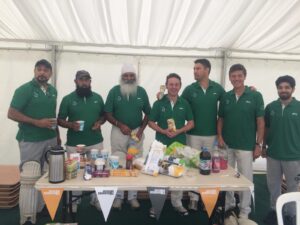Sport can build social cohesion across divides but the prevalence of racism in cricket undermines that work, says Amy Finch.

Spirit of 2012’s response to the ICEC report on racism and discrimination in cricket

Today the Independent Commission for Equity in Cricket publishes its long-awaited report into the realities of people’s experiences in cricket. The Commission was established more than two years ago, in March 2021, in response to serious allegations about discrimination and racism in the professional game.
The Commission’s findings are important to Spirit of 2012, and organisations like ours, who wish to use the power of sport, and sporting events, as a force for greater social cohesion and inclusion. For the past decade we have funded work which brings people together using physical activity, learning about what works and what barriers prevent it from happening at scale. This included a four-year project, Breaking Boundaries, led by the Youth Sport Trust and Sporting Equals inspired by the 2017 and 2019 women’s and men’s Cricket World Cups. At a time when elite cricket was being rocked by Azeem Rafiq’s statements about institutional racism, YST and Sporting Equals were working with communities in five UK cities to see how cricket could build bridges across racial, cultural and religious divides.
We submitted our own findings to the ICEC in April last year, sharing the views of young people who were taking part in the project – you can read them in full here.

Major sporting events can be an inspiration for change at a community level, bringing people together around a shared passion or interest, generating feelings of belonging or civic pride. In their report as part of our Inquiry into maximising the power of events, British Future explains: Events bring people together, helping to promote integration through social contact, most importantly ‘bridging contact’ between people from different backgrounds, which can help break down stereotypes and prejudice. Events also offer an opportunity to reshape public narratives, helping to project an inclusive sense of national identity and tell a story of an inclusive ‘new us’. The report includes a chapter on cricket and its “struggle to become a social contact sport”.
Our inquiry concluded with a recommendation that more events should use their potential to bring people together across divides, and a series of grants – Moments to Connect – to explore how to do this more effectively.
Clearly what happens at an elite level has an impact on how effectively sport and sporting events can bring people together. They can be public demonstrations of inclusion and anti-racism, such as Gareth Southgate’s England which is currently being celebrated in a James Graham play for this very reason, or they can undermine trust. Ultimately cohesion cannot exist where racism prevails.
Part of the original planning for Breaking Boundaries came from working with the ECB, who wanted to know more about why some racialised minorities were staying away from formal cricketing infrastructure. The ICEC report provides some stark answers to this question.
It seems like elite sport can look to the grassroots for lessons about how to increase social cohesion through sport. Breaking Boundaries, which officially closed this February, worked with 379 young champions to put on events and regular activities across the five cities, clocking up almost 4000 hours of volunteering. They found particularly success with their “twinning” model, pairing organisations typically used by different sections of the community to work together on specific events.
Attempts to use sport to increase social cohesion are not the same as the vital work to establish equity and eliminate racism across the sporting world. The latter is necessary regardless of whether it leads to greater cohesion, and as the ICEC report demonstrates, there is a long way to go. But learning about what makes effective sport for social cohesion can make an important contribution. Another of our grants, Shared Goals – delivered by British Future – seeks to bridge the gap between football clubs’ anti-racism campaigns and their community outreach work. Alongside Sport England, we also funded Belong’s Sport for Cohesion measurement toolkit to help projects get beyond the rhetoric and understand the difference they’re making to cohesion on the ground.
The ICEC’s findings are damning and must be acted upon. They also make clear the challenges for those of us attempting to use physical activity and sporting events to bring people together. When seeking to repair trust with racialised minorities, the ECB and other sports governing bodies should take lessons from projects such as Breaking Boundaries to move beyond the rhetoric and create a truly inclusive game.
Useful reading:
- Breaking Boundaries project page
- ICEC submission
- Moments to Connect project page
- Belong sport for cohesion measurement toolkit
- Seizing the Moment inquiry report
